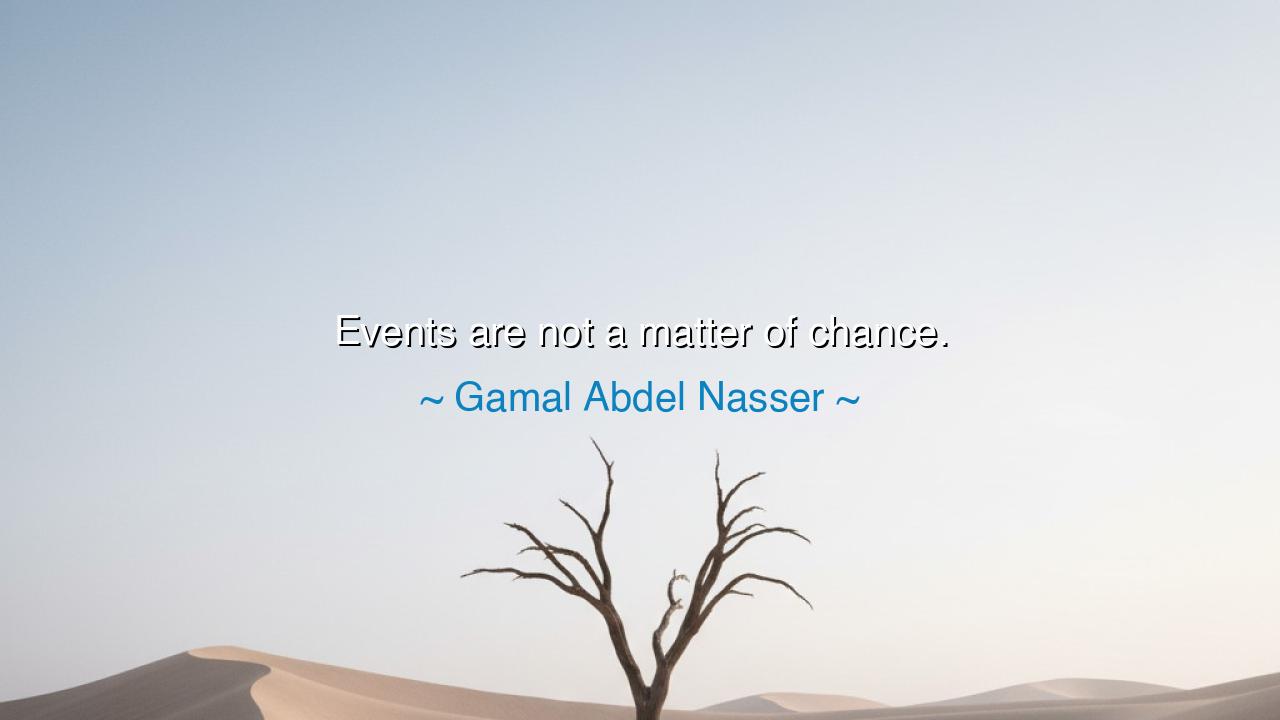
Events are not a matter of chance.






In the words of Gamal Abdel Nasser, "Events are not a matter of chance," we encounter a profound reflection on the nature of destiny, choice, and the invisible forces that shape our lives. Nasser, the bold leader who helped shape modern Egypt, reminds us that the course of history is not determined by random occurrences, but by the actions we take and the choices we make. This belief challenges the notion of fate or chance, proposing instead that events—whether personal, political, or global—are the product of deliberate action, intention, and purpose.
This idea is rooted in ancient wisdom, where the great thinkers of Greece and Rome spoke often of the power of human agency in shaping events. Aristotle argued that while the world is full of chance, it is the rational mind that shapes the future through deliberate action. In his works, he emphasized that while the cosmos may appear chaotic, human beings possess the ability to shape their destinies through their choices, their virtues, and their actions. Nasser echoes this belief, asserting that events are not mere accidents or coincidences, but the culmination of intentional decisions that steer the course of history.
Consider the example of Alexander the Great, whose conquests were not the result of chance, but of his strategic mind and unwavering ambition. Alexander’s rise to power, from the moment he took command of the Macedonian army, was not a matter of chance. It was the product of careful planning, bold choices, and an understanding of the world and its potential. His victories were not accidents, but the result of action and the choices he made, from military strategy to diplomacy. The same can be said of Gamal Abdel Nasser, who, through his leadership and vision, shaped the future of Egypt, making a series of choices that would impact generations to come. Both Nasser and Alexander illustrate the powerful truth that events are often the result of human effort, guided by vision, will, and determination.
The notion that events are not a matter of chance calls into question the idea of a passive existence, where we are mere spectators of our lives. Ancient philosophers like Socrates and Plato taught that personal development and virtue were essential to shaping the course of life. Socrates believed that by examining our actions and living thoughtfully, we could lead lives that were not subject to randomness but to reason and purpose. This alignment with virtue and conscious action would guide our lives toward meaningful outcomes. Nasser, too, reflects this belief in his statement, urging us to take ownership of the events in our lives and understand that we have the power to shape them, through the choices we make, and through our ability to act purposefully in the world.
Yet, Nasser’s words are not just about individual agency; they also speak to the larger forces that govern societies and nations. The history of nations is not simply written by chance, but by the vision of leaders who steer their people through crucial decisions. This is evident in the great leadership of figures like Winston Churchill, whose actions during World War II were not the result of chance, but of tactical decisions, resolve, and the conviction to resist tyranny. Churchill’s leadership, much like Nasser’s, demonstrates how events, whether on a national or global scale, are influenced by leaders' intentions, and the choices they make in the face of adversity.
The lesson in Nasser’s quote is one of empowerment—it teaches us that we are not passive actors in our lives. Our future is not simply a product of chance or circumstance, but of the choices we make each day. Just as Nasser took the reins of power and led Egypt through a period of great change, we too must recognize the power we have to shape our own lives and destinies. The challenges we face, both personally and collectively, are not random; they are opportunities for growth and action. When we embrace the idea that events are not a matter of chance, we take responsibility for our actions and understand that every moment is a chance to move towards the future we desire.
In our own lives, we must ask ourselves: What choices am I making today that will shape tomorrow’s events? Are we acting with intention, or letting life pass by without purpose? Nasser’s words remind us that we have the ability to make change, to direct our actions toward meaningful ends. Like the ancient leaders and philosophers who understood the importance of action and intention, we too must take deliberate steps to create the future we wish to see. Let us not wait for chance to determine our lives, but rather take control of the narrative and create a life that is shaped by purpose, vision, and intentional effort.






AAdministratorAdministrator
Welcome, honored guests. Please leave a comment, we will respond soon